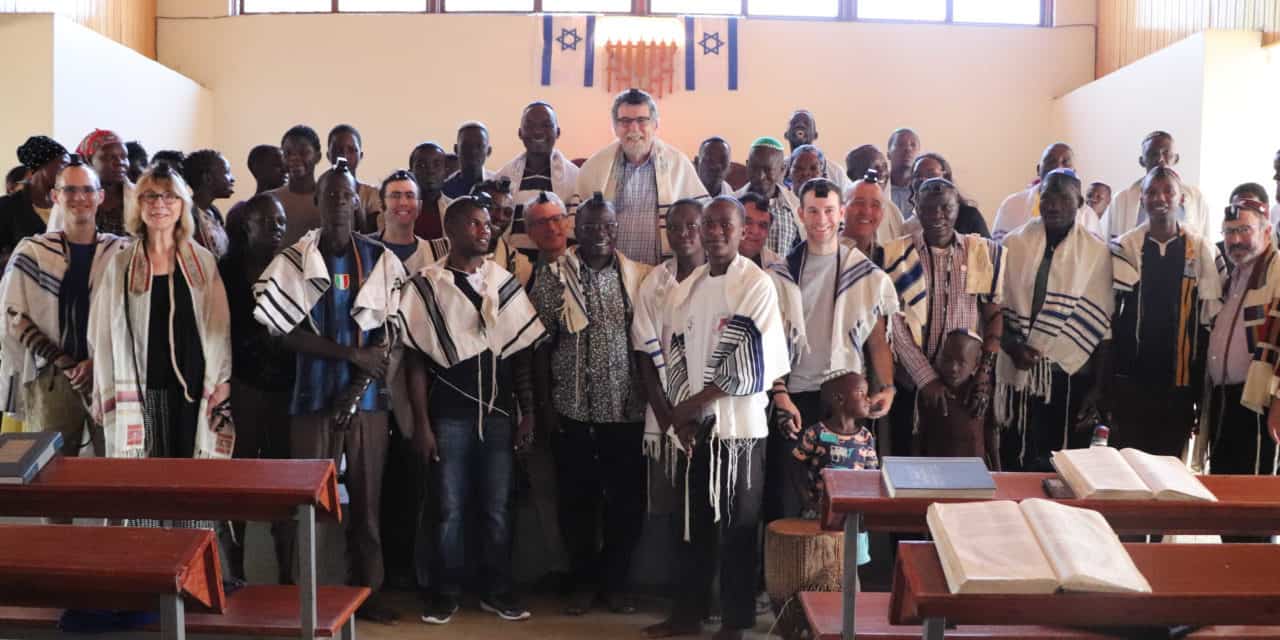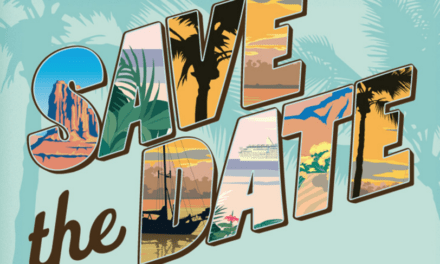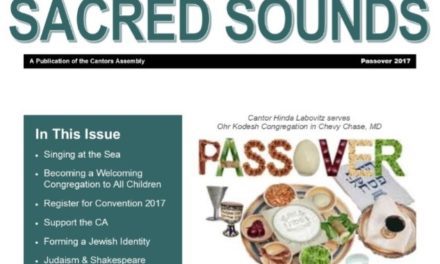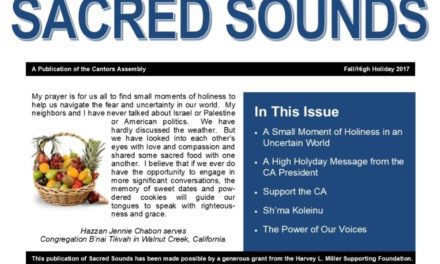The following is the edited text of a sermon given on Saturday, March 2 at the Highland Park Conservative Temple-Congregation Anshe Emet in Highland Park, NJ.
Shabbat Shalom
I want to start by saying that I’ve never thought of myself as much of an activist. For the most part, I’ve been content to leave missions, demonstrations and political action to others. I’ve never even been to AIPAC!
Which is why what happened last May still seems all the more surreal to me. I never expected to go to Uganda or to even want to go to Uganda. I knew that there were Jews there, but had no great need to learn about them or sing their music, and, honestly, I thought the big kippot I saw every once in a while were interesting but a little kooky.
“After years of deliberations, the Israeli Interior Ministry [had] resolved not to grant recognition to the Jewish community of Uganda.”
But on May 31, 2018, an article in Ha’aretz changed all that.
in response to the first and only request by a Ugandan Jew to make Aliyah, Haaretz reported that “After years of deliberations, the Israeli Interior Ministry [had] resolved not to grant recognition to the Jewish community of Uganda.”
Having spent my first year of cantorial school in Israel at the same time as the rabbi of their community, Gershom Sizomu, I knew a little bit about them, and had heard some of their music. I knew that they were Conservative, but that’s about it. Now, before I comment on the article--and I will comment on the article--I want to back up and give you a little background about the Jews of Uganda and where they came from?
Who are the Abayudaya?
The Jews of Uganda are known as the Abayudaya, which simply means the “People of Judah” in their native language of Luganda. So, in fact, we are no less Abayudaya than they are. They are not, and don’t claim to be, as some often assume, one of the lost tribes of Israel. They are native Ugandans who adopted Judaism, or their best understanding of it, with nothing but a Christian Bible as their primary source material in the beginning.
The community was founded by a military leader named Semei Kakungulu who had converted to Christianity in 1880. When the British promised to make him king over the territories he helped them conquer, he orchestrated military victories over most of eastern Uganda. But the British soon made it clear that they had no intention of following through on that promise, so he distanced himself from them, physically, politically and, most important for our purposes, spiritually.
According to the story, Kakungulu responded by saying, “If this is the case then, from this day on, I am a Jew.”
In 1913, according to Dr. Aryeh Oded z”l, a veteran Israeli diplomat and scholar who spent many years living in and visiting the community before his death this past February 4--during our mission--Kakungulu retired from all his political and military positions and became a member of a breakaway, fundamentalist Christian sect known as the Bamalaki.
The Bamalaki were problematic for the British for several reasons but mostly because they insisted on observing the Sabbath on Saturday instead of Sunday and because they didn’t believe in medicine or immunizations.
But if it was dissatisfaction with the British that drove Kakungulu to the Bamalaki, it was something very different that led him to Judaism.
He began to study the Old Testament and came to believe that it was the source of all Biblical authority. He started to insist that the Bamalaki follow all the laws of Moses, including and especially circumcision. The Bamalaki opposed circumcision on the grounds that circumcising 8-day-old boys was only practiced by Jews who did not believe in Jesus Christ and the New Testament.
According to the story, Kakungulu responded by saying, “If this is the case then, from this day on, I am a Jew.”
And so, in 1919, though he didn’t actually reject other Christian practices like Baptism, Kakungulu was circumcised. He proceeded to circumcise his sons and encouraged his supporters and many members of his family to do the same. In 1922, with no outside guidance, he published a 90-page book of rules and prayers as a guide for his community based on his understanding of the laws he found in the Old Testament, with a few choice New Testament verses thrown in for good measure.
Up to that point, he never knew that there was any such thing as Judaism. It wasn’t until 1925 that Kakungulu had his first contact with Jews from the outside world, who provided him with his first Hebrew-English Tanakh. They taught the community how to read Hebrew, how to keep the Sabbath, to recite prayers and blessings in Hebrew, wear kippot, follow the Hebrew calendar, observe the cycle of holidays, and perform sh’chita.
In addition to mikveh, the Beit Din consisted of one basic question, 'Why do you want to be Jewish?', to which the Abayudaya generally responded: "I was born Jewish and I'd like to stay Jewish."
After Kakungulu’s death in 1928, the community endured a decade of internal political turmoil during which several of his disciples vied with one another to become leaders of the community. Eventually, Samson Mugombe won out and became leader of the community for the next 50 plus years. Over that time, the population of the community went from a high of about 2000 to only 300 by the end of Idi Amin’s rule. Whatever their numbers, their passion for learning and for contact with Jews from the rest of the world never waned and today, they number somewhere in the vicinity of 2500 - 3000. Mugombe’s grandchildren became the primary leaders of the community, and are still leading the community today.
So that’s where they came from. Now I want to give you some background to understand the Ha’aretz story.
Up until 2003, Israel had never recognized the Abayudaya as a legitimate Jewish community, since they had never formally converted to Judaism.
So why did they convert as Conservative Jews? When we were there, we asked the question over and over again and the answer was always the same: because they believe in Torah and in egalitarianism.
In an attempt to change that, in 2003, Gershom Sizomu, one of Mugombe’s grandsons who was already functioning as the spiritual leader of the community, sought Israeli approval of the Abayudaya by inviting four Conservative U.S. rabbis to conduct a conversion ceremony for 300 Abayudaya Jews, which they did in 2003. In addition to mikveh, the Beit Din consisted of one basic question, 'Why do you want to be Jewish?', to which the Abayudaya generally responded: "I was born Jewish and I'd like to stay Jewish."
BTW, there is a wonderful, Emmy-award winning documentary, Yearning to Belong on this event that you can find on YouTube and watch all of this. Just search for "Abayudaya conversion," and it’s the first thing that comes up.
2003 was also the year that Sizomu, under the sponsorship of Bechol Lashon, and NGO that is active in numerous African Jewish communities, began his formal rabbinical studies at the Ziegler Rabbinical School in Los Angeles. When he graduated in 2008, he became the first ever native sub-Saharan African to become an ordained rabbi of any denomination.
He returned to Uganda, and immediately converted 250 more people, including converts from Nigeria, Kenya and South Africa. Now the important thing to keep in mind about these “converts” is that they had already lived their entire lives as Torah-observant Jews. These were no “shotgun” conversions just to pad the rolls. These were people who had never known any other life than a Jewish one.
The overhelming majority of Abayudaya are Conservative or Masorti Jews, with a small number who have undergone Orthodox conversion under the auspices of Rabbi Shlomo Riskin. So why did they convert as Conservative Jews? When we were there, we asked the question over and over again and the answer was always the same: because they believe in Torah and in egalitarianism. For most, though not all of them, Conservative Judaism was the only way to go.
And, as far as Israel is concerned, that is where the problems begin.
I felt that the Interior Ministry decision was a slap in the face to me personally as a leader within the Conservative movement and I wanted to make a statement that, as much as I love Israel, this was not okay.
The Jewish Agency recognized the Abayudaya in 2010, but in May 2018, the Interior Ministry, which has final say over matters of conversion, said that Kibita Yosef, one of my new Facebook friends, would not be permitted to make aliyah because the Jewish status of the entire Abayudaya community was being rejected. He’s now living in Keren Kolot Kibbutz Keturah near Eilat while his case is waiting to be decided by Israel’s Supreme Court.
When the news broke about this case back in May, I was on my way to the annual Cantors Assembly convention. To be honest, I felt that the Interior Ministry decision was a slap in the face to me personally as a leader within the Conservative movement and I wanted to make a statement that, as much as I love Israel, this was not okay. As I started discussing the situation with my colleagues, I found out that many of them felt the same way.
We wanted to let the Abayudaya know that we didn’t think it was okay, either. We also wanted to find out how they felt about it. Were they angry? Were they disappointed? Did it even matter to them?
Now, to be totally even-handed about this, a lot of Orthodox conversions aren’t being accepted by the Interior Ministry these days, including Shlomo Riskin’s, so the Orthodox Abayudaya are not going to Israel anytime soon, either. The upshot is that the Jewish status of an entire community is being denied even though they have lived their whole lives as observant Jews, in some cases for up to five generations.
So, at our convention, we decided that we wanted to show our solidarity with the Abayudaya by going to visit them. We didn’t know what it would look like, but we felt we had to do it.
What started as a mission of solidarity borne out of a polarizing political event started turning into something much more profound.
One of our members, Hazzan Mike Stein of Los Angeles, had become good friends with Rabbi Sizomu during his time in rabbinical school there. He had already been to Uganda several times over the intervening years, arranged for numerous donations, including a Torah and a centrifuge for the health center, and had helped to record a lot of Abayudaya music in the past. So he knew the landscape pretty well already, figuratively and literally.
Along with former CA president Hazzan Jack Chomsky, of Columbus, OH, Mike became our de facto tour guide and leader, helping to arrange for flights, hotels, drivers, immunizations and food for our group, which came to include 9 cantors, 1 musicologist, and 1 lawyer. (The musicologist and the lawyer also happened to be spouses of two of our mission participants.)
And as our weekly meetings unfolded, what started as a mission of solidarity borne out of a polarizing political event started turning into something much more profound. At Mike’s urging, given that 2019 marks the centennial of the founding of the community, we decided to undertake a recording project to document 100 years of music of the Abayudaya.
We conducted lengthy recording sessions in Kampala and Mbale which, I can tell you, were both hugely exciting and boring at the same time. Boring, because recording studios, apparently...whether they’re here, in Uganda or anywhere else, are pretty boring places...and exciting, because I got to marvel at the talent of my colleagues and the joy and creativity of the performers as the tracks were laid down.
One side note: the “recording studio” in Kampala was a cramped little room with no air conditioning, no ventilation and just a tiny little LED light in the middle of the ceiling...AND it was 90 degrees outside...AND we spent two straight days in that tiny little room. It wasn’t easy but it was worth it.
So what did we learn while we were there?
To echo the words of my colleague, Jack Chomsky, what this community has achieved in only 100 years took the rest of the Jewish world thousands of years to accomplish.
And they did it despite crushing poverty.
It goes without saying that Uganda is a poor country, but we were told that the rate of unemployment among the Abayudaya is 90%. School in Uganda is neither free nor compulsory.
I think the most emotional experience that I had was with a young man that I met on Shabbat in Nabugoye. He’s 19 years old and has been living on his own with no parents since the age of six. He goes to school as much as he can, but has to take time off on a regular basis to go make money so that he can pay his fees and pay for his typhoid medicine. To earn money, he makes bricks. When he gets enough money to pay his fees, he goes back to school until the money runs out, and then he goes to work again. Unless he's sick, in which case he neither goes to school nor works. He wants to be a doctor someday, though, and something about him made me think he just might do it. Since it was Shabbat and he didn’t have any parents, I asked him if it would be alright if I gave him a berachah. So I did. I’ll never forget that moment.
Before we went, we were advised not to wear our kippot in public. But when we arrived at Entebbe airport, our on-the-ground guide and now, friend, Yonatan Katz Lukato, showed up wearing a brightly-colored knit kippah. He said that there are so few Jews in Uganda that nobody really knows what it is and that people ask him about it all the time. How few Jews are there? Out of approximately 40 million people in Uganda, the 2500 or so Abayudaya make up about .0000625% of the population.
Talk about being a minority.
At the risk of sounding shallow, I want to share an image that has really stuck with me. I couldn’t get over the dirt. Bright...red...dirt...everywhere.
And speaking of kippot, the Abayudaya are famous for their beautiful hand-made kippot. We placed an order for over $4000 worth of kippot and challah covers, which is by far the largest order they'd ever had. It took 20 women at least six weeks of non-stop work to produce our orders and brought a significant amount of desperately-needed income to the community.
But I want to get back to the poverty for a moment, because I have to admit that, not having traveled extensively, that was one of the most striking things for me. I have seen plenty of documentaries about poverty in Africa, iincluding some about the Abayudaya, but I never really understood it until I saw it myself and I looked into the faces of children who actually didn’t know where their next meal was coming from.
For the most part, people live in handmade brick huts with thatch or tin roofs. At the risk of sounding shallow, I want to share an image that has really stuck with me. I couldn’t get over the dirt.
Bright...red...dirt...everywhere.
Even the paved roads--which were in short supply in a lot of the places we visited--even the paved roads were filled with dirt, because even if the streets were paved, there were no sidewalks. Just a street....dirt...and then a storefront. There was just a lot of dirt.
One of my colleagues asked their spiritual leader what their most important need was, and he said they needed rice for Shabbat. Not a Torah. Not a ROOF. Not even water. They need rice.
But when you walk into someone’s home, there is no dirt. There’s no dirt because they take their shoes off before they go inside. That might just seem practical, but we also noticed that they also take their shoes off before they enter shul. We all thought that was strange at first.
But what we learned, though, is that as Jews whose only source of Judaic knowledge for decades was the Torah, their custom is based on a literal reading of what happened at the burning bush--God’s injunction to Moses in Shemot, Chapter 3, verse 5: “put off thy shoes from thy feet, for the place whereupon standest is holy ground.” For them, the synagogue is holy ground, so they take off their shoes.
The other vivid memory I have is the music...the sounds of synagogue after synagogue full of beautiful, joyful music. Even in the synagogue that you could barely even call a building, there was music. The village of Nalubembe is so poor that their synagogue is literally an unfinished brick shack with only half a tin roof and no doors. Half a roof. They don’t have a Torah because a) they are the smallest of the Abayudaya communities, b) Torahs aren’t in plentiful supply in Uganda, and c) they have no safe place to keep one. (Note: I’d say they can’t afford a Torah, but none of these communities would be able to afford a Torah if their only option would be to buy one.)
And in that village--many of them are not even Jewish yet--they study, they pray, they hope one day to convert and they’re living Jewish lives. We davened Minchah with them. They sang with us. They sang for us.
As cantors, we promised ourselves before we left that we would do something that cantors are rarely accused of doing: listening.
One of my colleagues asked their spiritual leader what their most important need was, and he said they needed rice for Shabbat. Not a Torah. Not a ROOF. Not even water.
They need rice.
Apparently if you have a celebration and you don’t serve rice, it’s like you hadn’t served anything. To have an oneg Shabbat, you need rice.
Anyway...back to the music.
As cantors, we promised ourselves before we left that we would do something that cantors are rarely accused of doing: listening.
We wanted to listen to them. Knowing, as we did, that the Abayudaya are already famous for their music, in addition to the actual recording project, we just wanted to listen. And they didn’t disappoint.
We listened to them sing. We listened to their stories. We interviewed them. We conducted over a dozen lengthy on-camera interviews on a whole range of topics, including many of the issues that have dominated our headlines. We learned from them and with them. We davened together. We celebrated Shabbat together. One of our members even arranged to bring them a Torah, and we celebrated their new Torah in an emotional ceremony that was absolutely unforgettable.
So we went there to listen.
But they had other plans. They wanted to listen to US. They are so hungry to learn. Hungry to learn our music. Hungry to learn more prayers. Hungry to learn Hebrew. Hungry to be more Jewish and to do things the way other Jews do them. So instead of listening to them do all the davening, we ended up trading off leading different parts of all the services, including Shabbat and two days of Rosh Hodesh.
And everywhere we went, we were greeted by music and song.
They want to connect to other Jews. They want to connect to the rest of the Jewish world. They just want to connect.
In addition to spending Shabbat in Nabugoye, we visited four of the other Abayudaya villages, including an emerging community called Mukono that is looking to be associated with the Orthodox. It was the only synagogue we visited that had an actual mechitza, though it was interesting to note that, as a custom, not as a matter of law, men and women tend to sit separately in all the shuls we visited.
After being greeted by each community’s spiritual leader, in one impoverished village after another, we were given the most precious gift they could possibly give us: they sang, danced and performed for us.
That’s just a small taste of what we experienced.
So what’s next, if anything?
I’ve got a lot of new Facebook friends now, actually. In fact, I have a new policy with regard to anyone from the Ugandan community who sends me a friend request. I just accept it, even if I didn’t meet him or her, and regardless of how persistent they might be asking for money and other things. I do this because I learned that the Jews of Uganda want the same thing we all want: they want to feel like they belong. They want to connect. They want recognition from Israel not, as the Interior Ministry fears, so they can move there, but because Israel is the ancestral home of ALL the Jewish people.
They want to connect to other Jews.
They want to connect to the rest of the Jewish world.
They just want to connect.
So, if there’s any one thing that we can do to make their lives better, it would be to forge connections with them in any and every way possible. And that should be an easy sell.
Which brings me round to this week’s parashah. I had to work it in somehow.
This is Shabbat Shekalim.
Just as each male Jew was commanded to give a half shekel to support the building of the mishkan, we all give our half shekel (or more) to support our own shul, as we should. What I am asking is that, as a community, in the micro and macro sense, we put our heads together to find additional ways to connect with the Abayudaya community, to stretch that half shekel just a little bit further and help not only to make them feel more connected to the Jewish world but maybe even to provide for some of their more urgent needs.
The reality is that we fund all these priorities, not because we need to; we do it because we care about the Jewish past, present and future of all Jews, not just the ones we know personally.
And why would we want to support an impoverished community on the other side of the world when our needs at home are also pressing? For the same reason we support our own Jewish institutions, schools and even impoverished communities in Israel: because we know that without our support, they would neither thrive, nor in many cases survive. It costs a lot of money to run a shul--often an amount that far exceeds dues collected. Jewish education also costs a lot of money. Without the support of philanthropists and other donors, a quality Jewish education would be well beyond the finances of most families. Even, and perhaps especially, the State of Israel itself would never have become the "Startup Nation" it has become without outside assistance. I could give an unending list of additional examples.
But the reality is that we fund all these priorities, not because we need to; we do it because we care about the Jewish past, present and future of all Jews, not just the ones we know personally. And so, on this Shabbat Shekalim, I want to talk about just a few of the needs of this community and why I believe it is critical that we should all start including them on our tzedakah list from this time forward.
What can we do?
Let's start with the low-hanging fruit.
They need books.
What they have now are mostly old, dilapidated, cast-offs destined for the geniza. If every shul that updated to the new Lev Shalem siddurim and machzorim committed to buying half a dozen extra for the Ugandan community, in just a few years, every synagogue in Uganda would have a stock of fresh, new prayerbooks. Even if we continued to gather the old Sim Shalom or Siddur Hadash prayerbooks as they became available, it would still be a vast improvement over what they have now.
We can do that.
They need Torahs.
Think of the number of shuls that are blessed with more Torahs than they know what to do with, including pasul Torahs that sit for years unrepaired and that could be easily repaired and give the gift of Torah to a community that has no means to purchase its own.
We can do that.
They need income.
I’m wearing one of my new Abayudaya kippot. We purchased kippot and challah covers on behalf of over 50 different synagogues and individuals around the country. They’re beautiful. They’re well-made. And they provide significant income to the members of the community. Think of every Bar and Bat Mitzvah you’ve ever been to. They give away kippot to all their guests.
Think of how many b’nai mitzvah there are every week in the hundreds of Conservative shuls across this country. Think of how many neon, lavender and bright orange kippot are purchased to be given away and that will never be worn again. If even a small percentage of those b’nai mitzvah chose to get hand-made kippot from Uganda instead of kippah.com, just imagine how that could improve the lives of our friends. Together, we could turn a relatively dull item on our to-do lists into the powerful mitzvah of tzedakah.
We can do that.
They need health care.
Access to adequate health care is one of the most urgent needs facing the community. So few of the people who come to the health clinic are able to pay for their own care that the clinic has to regularly prioritize paying the utility bills over salaries, just to stay operational each month. Rav Gershom regularly donates a sizable portion of his salary as a minister of Parliament to ensure that people receive the medical care they need. By supporting the clinic, we could have a huge impact on the Abayudaya and also help them maintain their already excellent relations with their Muslim and Christian neighbors who are also served by the clinic.
We can do that.
They need trained spiritual leaders.
Sponsoring a student to come and study in a seminary here for five years is no small commitment, and most of us don’t have anywhere near the kind of money it would take to make that happen. but we all know of Jewish benefactors in the broader Jewish community who have those kinds of resources. And some of us even know them personally. We can make those connections--and, believe me, we met some people who are already gifted spiritual leaders but yearn for the kind of legitimacy that can only be achieved through an extended, formal course of study.
We can do that.
But maybe most of all, they need education...secular and religious.
On this Shabbat Shekalim, I am inviting you to join me to help our African friends in an ongoing and meaningful way, whatever that may look like.
They’re hungry to learn. And they know that education is their ticket to sustainable prosperity. But the schools they have are in dire need of outside support. With the financial resources we have in the broader Jewish community, we could easily find a way to provide for some of their needs, just as we do for our own local day schools.
To teach Jewish subjects, we could create scholarships for rabbis and cantors to travel to Uganda on mini-sabbaticals, one after another, for a week or two at a time to be scholars in residence. To teach Torah, to teach Jewish history, cantillation, nusah and general Judaic knowledge.
We can do that.
My colleagues and I who travelled to Uganda have committed to continue working together, under the auspices of the Cantors Assembly, towards the fulfillment of the community’s most pressing needs as best we can. The only way we’ll be able to do that is with the help of all of our own communities. And so, on this Shabbat Shekalim, I am inviting you to join me to help our African friends in an ongoing and meaningful way, whatever that may look like.
We’re not asking anyone to write any checks YET (because it's Shabbat, of course), but at the very least, I would like to think that we can host some of our new friends here at our shul for a Shabbat and get to know them. We can keep buying kippot and challah covers, give them as gifts, listen to their music, buy their CDs, donate siddurim and sefarim, donate toys and musical instruments, keep the Abayudaya in mind when we give tzedakah, help them locate the resources they need not just to survive but to thrive, maybe help them get a little bit of rice for Shabbat or even a whole roof for their shul...and maybe, just maybe we can even pay them another visit together.
And why would we want to do all this? Because as Jews, we take care of our own.
After all, we are all Abayudaya.
Shabbat Shalom




